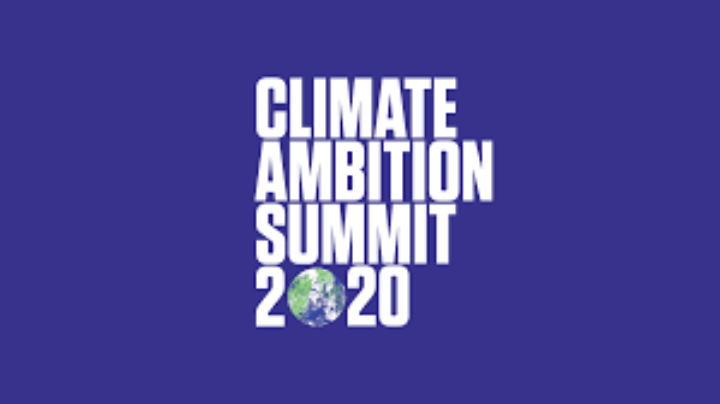Building momentum for climate action at the end of 2020
A glimmer of hope for the global climate action, as we approach the fifth anniversary of the Paris Agreement
By Alison Doig
Share
Last updated:
As this difficult Covid-19 afflicted year comes to a close, there is a glimmer of hope with vaccines becoming available. This week we may also start to see a glimmer of hope for the other global crisis of climate change, which will increasingly be in the news as the week passes, leading as it does to the so-called ‘Parisversaire’, the fifth anniversary of the Paris Agreement, on Saturday 12th.

While advocates for action may not want to get their hopes too high, too soon, this week should see many of the world’s nations stepping forward with increased pledges of action, putting climate goals back in sight.
On Wednesday we will hear clarion calls from two sources, the United Nations Environment Programme (UNEP) and the world’s least developed countries (LDCs).
UNEP will update its Emissions Gap report on Wednesday, telling us how far governments are from achieving their Paris Agreement commitments to keep global temperature rise well below 2oC and pursue the safer goal of 1.5oC. The report is likely to tell us that the pledges we saw recently from the likes of China and Japan targeting net zero emissions around mid-century are moving us nearer to delivering 2oC of warming (an improvement on the situation at the time of the Paris summit five years ago when we were heading for a temperature rise of around 3.2oC). But clearly, that leaves much more to be done in the coming 10 years in order to keep the 1.5oC limit in sight. So: right direction, but governments need to rapidly increase the speed of action.

On the same day the LDCs will hold their ‘Thimphu Ambition Summit: Momentum for a 1.5°C World’ and will not put any gloss on the crisis they face from the very present threat of climate change. The world’s most vulnerable countries, whose people and economies are already straining to respond to their changing weather patterns, will tell the world ‘there is an existential need for faster, deeper emissions reductions at scale, for building the capacity of countries to adapt to climate impacts and increase resilience against climate shocks’.
The week also brings a number of other reports including a couple that look intriguing. One will be analysing the real-economy moves since the Paris summit in areas such as clean energy and transport, and looking at the opportunities that it is creating for jobs and economies. And ECIU itself will be looking at what more we know than we did five years ago about the impact of climate change on extreme weather.
By the end of the week we should see a number of countries stepping up to the challenge (or, if you prefer, the opportunity). The UK will officially present its first climate commitment outside of the EU, confirming the new UK emissions reduction target announced last week by the Prime Minister of at least 68% by 2030 (from 1990 levels). In addition, on Wednesday we will see the recommendations from the UK’s independent advisers on climate change, the Climate Change Committee (CCC) for the 6th Carbon Budget, which will extend the UK's national carbon-cutting pathway into the mid-2030s.
The European Union is expected to increase its 2030 target from its current level of 40% up to between 55% and 60%, to be agreed at the EU leaders’ summit on 10th-11th
December. Ahead of this summit Denmark has already declared it will commit to a 70% cut by 2030 and start to phase out all its oil and gas production from the North Sea by 2050.

On Saturday 12th December, the fifth anniversary of the Paris Agreement, the UK government together with Italy, France, Chile and the UN will host the virtual Climate Ambition Summit. COP26 President Alok Sharma has written to the leader of every country that has ratified the Paris Agreement inviting them to make ambitious commitments at the Summit. These commitments are likely to be made by heads of state via pre-recorded video. The Climate Ambition Summit hosts are calling on UN member states to set out stronger commitments, in particular new 2030 targets.
The recent pledges by Japan and South Korea to be net zero by 2050, and China setting its net zero goal by 2060, offer a real prospect of them coming forward with their new 2030 targets this week. But it may be too early for some: China after all is still going through the process of agreeing its 14th Five-Year Plan. We will probably not know the extent of these pledges, if they come, until the 12th.
We hear there are over 70 countries lined up to make commitments at the event. Many least developed and vulnerable countries are expected to announce enhanced NDCs following the ‘Midnight Climate Survival’ campaign from the Climate Vulnerable Forum (CVF) which is calling for urgent action by all countries.
While President Elect Joe Biden's administration promises to re-join the Paris Agreement as soon as possible, it is unclear whether the incoming US administration will play any role at the summit. It is possible that Biden’s newly appointed Climate Envoy John Kerry could make an appearance, but more likely the US will be represented by businesses or city mayors.
A few big countries may not come forward with increased goals at all, including big coal-using states of India, Indonesia and South Africa. Others likely to be missing from the bill are those more reluctant to step up, including Brazil, Russia, Saudi Arabia and Australia, despite the very real climate impacts such as extreme heat and wildfires these countries face directly.
All remain part of the Paris Agreement, and all can expect growing pressure in the coming year to COP26 to be part of the climate solution. Their positioning on climate change will, for example, now be in stark contrast to the incoming White House resident and the accelerating changes to energy economics globally.
Of course, all of the new momentum will only succeed if countries actually deliver on their commitments and transform their economies towards a new zero emissions future. Doing so entails, of course, not just setting a 2050 target but also nearer-term ones and, most importantly, enacting measures to deliver. The coming week will do much to clarify how far and how fast governments are preparing to accelerate their action on the road to COP26 – and what they may be sacrificing if the answer is “not much”.
Share